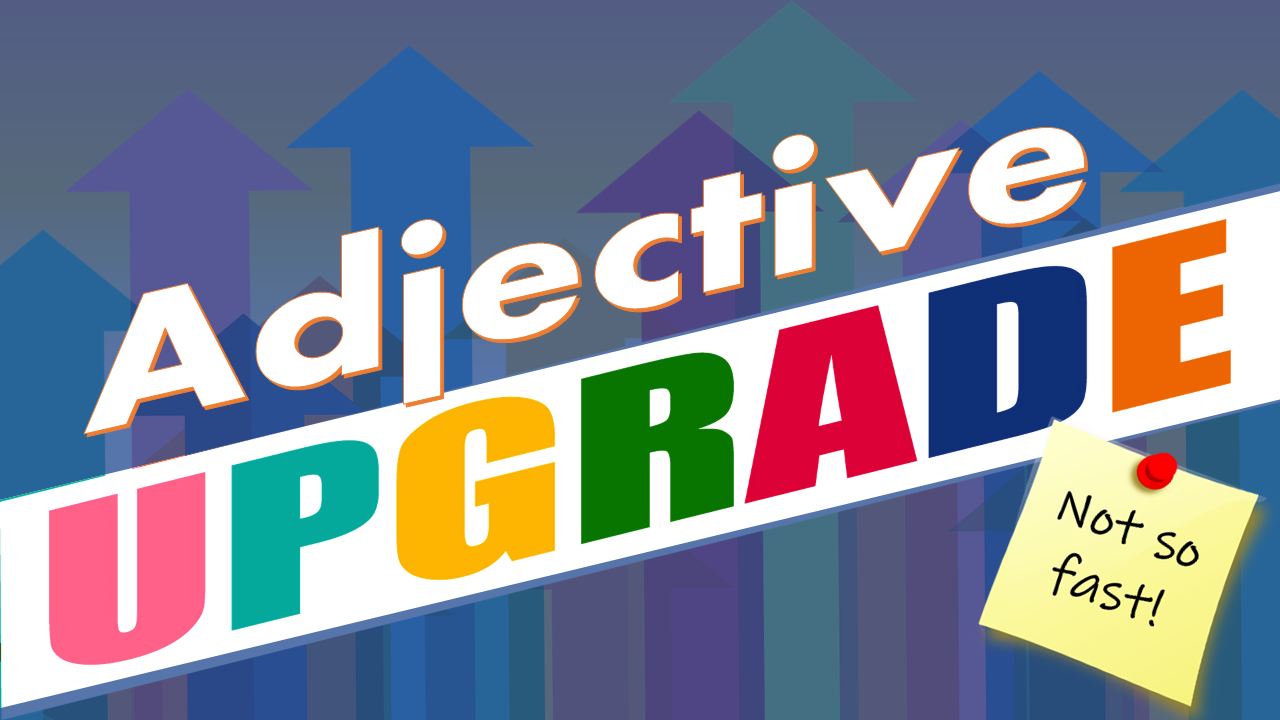Have you ever been told not to modify certain adjectives? This advice stems from a concept known as absolute adjectives. Grammarians believe modifying these adjectives is illogical and improper because, in their view, these adjectives cannot be reduced, enlarged, modified, or compared—they’re absolute. But many of these untouchable adjectives are often modified in daily usage. And that’s okay.
Non-Gradable, Not Absolute
While grammarians and writing instructors may fret about the future of the English language, linguists will tell you that the notion of an absolute adjective is ill-conceived. The question is whether an adjective is gradable or non-gradable, not whether it is an absolute.
Gradable adjectives can be described with modifying words to show degree. That means something can be less of that adjective or more of that adjective. Examples include expensive, funny, and tasty. Something can be less expensive than something else, funnier than something else, or the tastiest of all.
Non-gradable adjectives describe things that are either present or absent. Examples include superb, carnivorous, and freezing. Sometimes, they are already inherently superlative in their meaning. Non-gradable adjectives sound wrong when used in comparisons (more priceless, the most impossible).
Qualifying Adverbs: A Flexible Approach to Absolutes
Language defies simple rules. Adjectives are no exception. If you learned that adjectives are just words that describe nouns, you’re missing out on a lot of complexity and nuance. There’s also ambiguity. Linguists enjoy studying how people creatively break rules and create new ones (a descriptivist approach), while grammarians and writing instructors prefer clear rules (prescriptivist approach). In my training as a linguist, I’m more open, but because I work on WordRake’s editing software used for writing in a professional register, I balance linguistics and grammar, which I’ll try to do here. In professional writing, it’s risky to challenge your readers’ rules and myths, but if you learn to recognize “perceived” writing rules, you can decide whether to break them.
Common examples of absolute adjectives include dead, pregnant, unique, and complete. Grammarians (not necessarily linguists) say these adjectives should never be modified because they are binary concepts: someone is either pregnant or not pregnant; something is either complete or incomplete.
In theory, those adjectives are binary, but in practice, most English speakers view these concepts as a process, and not as a strictly binary state. Almost all fluent English speakers understand and accept ideas such as almost dead, nearly complete, highly unique, and the intentionally “incorrect” use of very pregnant as a joke to mean “at the end of the pregnancy.” The fact that so many people modify “absolute” adjectives shows that people understand these adjectives as representing transitions (for example, slowly changing from alive to dead; progressing from incomplete to complete), not as ideas that must be either/or. Linguists believe that if native speakers consistently say something, then it’s grammatically correct (even though it may imply a lower social status).
Rather than focusing on the difference between the prescriptive and descriptive approach, let’s consider how the definitions overlap. Most of what grammarians call absolute adjectives are what linguists call non-gradable adjectives.
A flexible approach that will help you sound professional but not stuffy would be to focus on qualifying adverbs. (Adverbs modify adjectives, which modify nouns.) Qualifying adverbs reduce the strength of the adjective; they are the opposite of intensifiers, which make the adjective stronger. Qualifying adverbs can modify seemingly absolute adjectives and be grammatically correct. In spoken language, you may hear these phrases:
The essay was almost perfect.
The task was nearly complete.
The siblings were kind of tall.
Superlative Adverbs: Do Not Mix with Absolutes
When grammarians and writing instructors tell you not to modify absolutes, they would be more accurate to say not to use superlative adverbs or extreme adverbs of degree with non-gradable adjectives. Superlative adverbs are a type of intensifier, but not all intensifiers are superlative adverbs. Grammarians and linguists agree on this rule, so avoid attaching adverbs like these to your non-gradable adjectives:
|
completely |
fully |
comprehensively |
|
totally |
wholly |
utterly |
|
entirely |
perfectly |
absolutely |
Grammarians rightfully argue that, when extreme adverbs modify non-gradable adjectives, they are usually redundant or unnecessary. WordRake agrees! Here are just a few of the cases in which WordRake deletes an extreme adverb before a non-gradable adjective:
The test was utterly impossible.
The universe is thought to be totally infinite.
They twins were completely identical.
The evidence was entirely inadmissible.
Frankly, this is a totally irresponsible an irresponsible spectacle.
My phone’s battery notification changes color when it’s completely full.
The County Commissioners’ vote was completely unanimous.
Here are some examples of edits that WordRake makes to extreme adverbs being used incorrectly before non-gradable adjectives:
The statue was completely priceless.
The rehearsal was wholly fundamental to the success of the show.
It was a totally addictive an addictive mystery thriller.
Secondary resources should be used only when absolutely necessary.
The remedy for holding a statute facially unconstitutional is to render the statute totally inoperative.
The answer was entirely false.
These factors are wholly irrelevant to whether Florida is a proper forum for this litigation.
The hotel rooms were utterly vacant.
Intensifiers: When More Is Less
Fans of prescriptive grammar also use the concept of absolute adjectives to talk about problems with intensifiers that are not extreme adverbs of degree. These adverbs produce a separate and more subjective problem: some adverbs are grammatical before any type of adjective, but they are inherently weak because they are overused and/or don’t provide much extra information. WordRake tightens writing by consistently deleting these adverbs, regardless of the type of adjective that comes next:
|
amazingly |
thoroughly |
decidedly |
|
terribly |
truly |
awfully |
|
expressly |
plainly |
keenly |
|
very |
phenomenally |
quite |
|
incredibly |
wholeheartedly |
remarkably |
|
extremely |
really |
seriously |
This book is a truly excellent an excellent text for both the statistical applications of these theories.
Mr. Brown said these preventable problems are seriously distracting to management.
My instructors were extremely helpful, encouraging, and generous with their time.
Thoroughly check your bags for prohibited items before heading to the airport.
It is quite rare for someone to bring something really unique to the pawn shop.
Notice that WordRake does NOT remove adverbs in cases of exceptions to the rule, when the adverb provides useful information about the adjective it’s paired with. For example:
The jury found the defendant to be fully responsible for the crime.
The university courses are being taught entirely online this year.
All employees must be fully vaccinated before returning to work.
The information on the epitaph was not quite true.
Common Yet Difficult Combinations
Many writers combine extreme adverbs of degree with non-gradable adjectives to produce two-word adjective phrases: combinations like completely unanticipated and generally prevalent. Many times, the adjective itself is already overly formal or general. When combined with a bland adverb of degree, the meaning becomes especially imprecise for readers. WordRake’s Simplicity editing mode improves upon some unnecessary adverb + difficult adjective combinations by suggesting a single word substitution: a clearer and easier adjective.
Desalination technology is especially prevalent common in coastal areas.
It was an enormous and absolutely unanticipated unexpected task.
No two crude oils from different sources are completely identical to the same as one another.
The parole agent acted on the theory that an outpatient's status was completely identical to the same as that of a parolee.
As a side note, writers also combine extreme adverbs with formal and abstract verbs in ways that obfuscate the information. WordRake Simplicity mode edits these combinations, too:
That detail should not take away the parties’ rights to proceed fully move forward with the arbitration.
It was clearly established that it was settled that the insurers would not take part.
The underlying mechanisms of the disease have not yet been fully elucidated are not yet clear.
In their report, the analysts do not entirely elucidate explain their solution to the problem.
Pause for Prescriptivism and Professionalism
Though linguists and grammarians sometimes disagree on what’s acceptable in writing, your reader ultimately decides. Learn the unbreakable rules and understand the bendable ones—you’ll subconsciously know which group is which. But if your sentence breaks the adjective rules described above, it may give your readers pause, force them to reread it, or even annoy them. These reactions to your writing make it less likely that you will be able to convince your reader of your point.
If you’re writing for work, choose formal register and write clearly. Do your best, then let WordRake help. In one click, it will suggest edits to improve your writing and help you apply the writing advice you and your readers will think is important for success. Don’t worry, the team behind WordRake considers which edits will help your writing become more effective and convincing, while balancing descriptive and prescriptive rules. Try WordRake for free now.
About the Author
Danielle Cosimo is a Language Usage Analyst for WordRake. Before joining the team, she was a translator and editor for non-native English speakers applying to degree programs in the United States and the UK. Danielle is formally trained in linguistics and has a certificate in computer programming. She is fluent in English, Portuguese, and Spanish. She applies her interdisciplinary knowledge to create WordRake’s editing algorithms. You can find her on LinkedIn.








